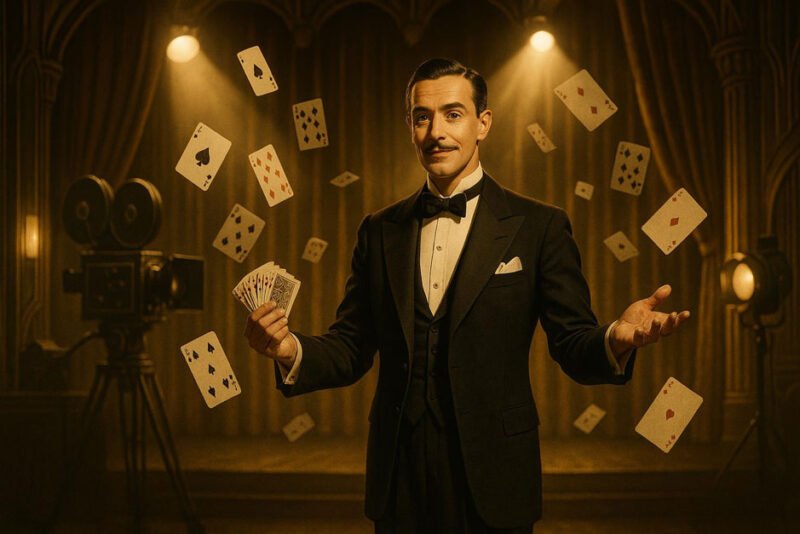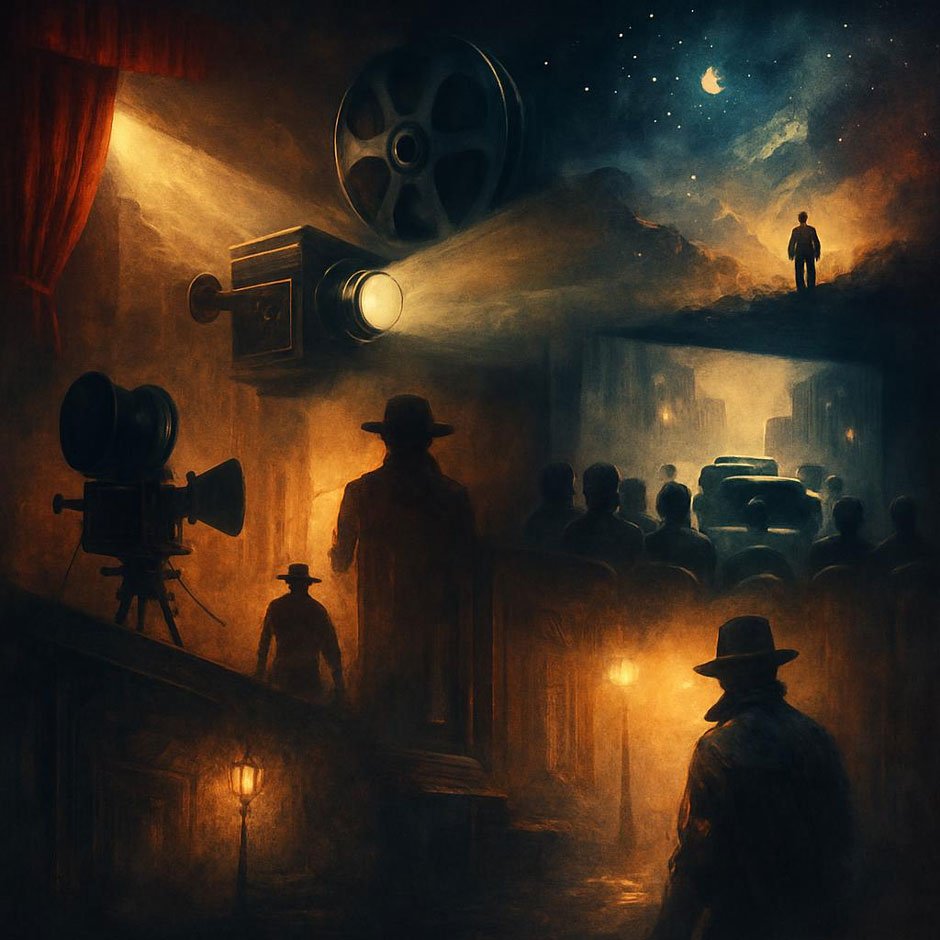When people think of versatile entertainers from Hollywood’s golden era, Harry Green’s name deserves recognition alongside the biggest stars of his time. This wasn’t just another actor trying to make it big in show business. Green, born Henry Blitzer in New York City back in 1892, managed something pretty extraordinary – he became a genuine multi-talent who could make audiences laugh whether he was on a vaudeville stage, in front of a movie camera, or performing magic tricks for royalty.
What makes Green’s story particularly interesting is how he completely reinvented himself. Here was a guy who actually trained as a lawyer, had the credentials and everything, but threw it all away to chase his dreams in entertainment. And it paid off in ways he probably never imagined when he first stepped onto those early vaudeville stages.
Early Life and Career Beginnings
You’d think someone born on April Fool’s Day might be destined for comedy, and in Harry Green’s case, that turned out to be pretty accurate. Growing up in New York City as Henry Blitzer, he seemed to follow a traditional path at first – studying law and getting all the right qualifications to become a respectable attorney.
But something about the entertainment world kept calling to him. By the 1910s, he’d made the bold decision to leave his legal career behind and dive headfirst into vaudeville. Teaming up with an old buddy, he created the comedy duo Ross & Green, and they quickly found their groove with audiences.
Their big hit was a routine called “The Hebrew Jockey and the Sport.” It might sound dated now, but back then, this kind of cultural comedy was exactly what vaudeville audiences wanted. Green had this natural ability to make people laugh while still treating his characters with respect and authenticity.
When he eventually went solo, Green developed something even more special – a one-act play called “The Cherry Tree” where he played George Washington Cohen. This character became his calling card, showing off his talent for creating memorable personas that stuck with audiences long after the curtain came down.
Hollywood Success as a Character Actor
Talk about perfect timing – Green made his Hollywood debut right when the movie industry was going through its biggest transformation ever. His first film, “Close Harmony” in 1929, came out just as “talkies” were taking over from silent movies. Suddenly, having a great voice mattered just as much as looking good on camera.
Lucky for Green, he had both. That warm, gravelly voice of his was pure gold for the new sound films, and his expressive face could sell a joke without saying a word. Over the next thirty years, he’d rack up appearances in more than sixty Hollywood productions – not bad for a former lawyer from New York.
Green found his niche playing Jewish characters, but he brought something special to these roles. Instead of just going for cheap laughs, he gave these characters real personality and heart. His short, stocky build and that lived-in face made him instantly recognizable, while his professional attitude earned him respect from everyone he worked with.
The guy got to work with some serious Hollywood royalty too. Picture this – sharing scenes with Gary Cooper in “The Spoilers,” working alongside Clara Bow in “True to the Navy,” and holding his own with comedy legend Fanny Brice in “Be Yourself!” These weren’t just small parts either; Green had become the kind of reliable character actor that directors knew they could count on to deliver every single time.
The Talented Magician and Author
Here’s where Green’s story gets really interesting – the guy wasn’t just an actor who did a few card tricks on the side. Professional magicians, the real deal, considered him one of the best card manipulators in the world. That’s not something you just pick up as a hobby; it takes years of dedicated practice to reach that level.
His magic skills opened doors that most actors could only dream of. We’re talking about private performances for the British Royal Family and high-profile international figures. Prince Philip himself would specifically ask Green to teach him new tricks whenever they met, always requesting something that would “really baffle the family.” Imagine being the go-to guy for entertaining royalty.
Green didn’t just perform magic – he studied it, wrote about it, and helped others learn it too. His book “Harry Green Says You Are a Magician” wasn’t some throwaway celebrity project. The Duke of Gloucester wrote the preface, which tells you something about how seriously the magic community took Green’s expertise.
What’s remarkable is how he balanced this with his acting career. Most people struggle to master one demanding skill, but Green was simultaneously building reputations in both entertainment and magic. It shows the kind of work ethic and natural talent that separated him from the typical Hollywood character actor.
Business Ventures and British Success
By the mid-1940s, Green had made a smart move that would define the rest of his life – he packed up his family and relocated to Britain. This wasn’t just about finding new opportunities; the guy had fallen in love with British culture and saw real potential there for someone with his talents.
The family settled into The Gabled Lodge in Maidenhead, Berkshire, and this wasn’t your average celebrity home. We’re talking about a proper estate with five-and-a-half acres, complete with a swimming pool and putting green. But the really impressive part was inside – Green had assembled one of Britain’s largest private collections of theatrical books, plus over five thousand antique intaglios (those are carved printing plates, for anyone wondering).
His business instincts were just as sharp as his entertainment skills. Green opened The Jack of Clubs, a nightclub on London’s Brewer Street that became the talk of the town. The place had this brilliant gimmick called the “Kiss Corner” where female celebrities would leave their lipstick marks on the wall. Princess Margaret was a regular, which tells you everything about the kind of clientele Green was attracting.
The money was clearly good – good enough to send both his sons to Harrow, one of Britain’s most exclusive schools. Green had successfully transformed himself from a vaudeville performer into a legitimate businessman and British society figure, all while maintaining his entertainment career.
Television Career and Final Performances
When television started taking off in the 1950s, a lot of older performers struggled to adapt to the new medium. Not Green – he embraced it completely and became one of the most recognizable faces on British TV. His natural charisma translated perfectly to the small screen, and audiences loved seeing him in their living rooms.
One of his most popular recurring roles was Mr. Perlmutter in “Potash and Perlmutter,” a Jewish-themed comedy that he performed across both radio and television. This character let Green showcase his cultural heritage while delivering the kind of authentic, heartfelt comedy that had made him famous in the first place.
His film work during this period showed he hadn’t lost his touch either. In 1955’s “Joe MacBeth,” a British take on Shakespeare’s Macbeth set in the American underworld, Green played Big Dutch with his usual flair. He also snagged a supporting role in Charlie Chaplin’s “A King in New York” in 1957 – not bad company to keep.
But perhaps his most personally satisfying project was “Isidor Comes to Town” in 1954. Green didn’t just star in this comedy-drama about antisemitism in a small English town – he adapted it for television himself. Critics raved about his performance, with one noting that “Mr Green is a personality who sweeps everything before him.” After decades in the business, he was still earning some of the best reviews of his career.
A Dramatic End to a Remarkable Life
Nobody could have predicted how Harry Green’s incredible career would end, but in a way, it was almost fitting for someone who had spent his entire life entertaining others. On May 30, 1958, Green was performing in “Poet’s Corner,” a live television play being broadcast from Associated-Rediffusion’s Wembley studios.
The show was going perfectly. Green was playing Mose, a tough-but-tender Jewish-American boxing manager – exactly the kind of role he could do in his sleep. The character was tailor-made for him, especially since he’d actually worked in boxing management earlier in his colorful life. Everything was running smoothly until it suddenly wasn’t.
During the live broadcast, Green suffered a fatal heart attack backstage. He was sixty-six years old and had been working steadily as an entertainer for nearly fifty years. The timing was both tragic and somehow poetic – a performer who had dedicated his entire adult life to the business literally died in service to his craft.
The chaos that followed at the television studio was immediate and intense. Here was a live show in progress, and their lead actor had just collapsed backstage. But even in that moment of crisis, Green’s professionalism shone through – the show had been going so well that audiences had no idea anything was wrong until much later.
Green’s death marked the end of an era in more ways than one. He represented the last of a generation that had successfully navigated every major change in entertainment – from vaudeville to Hollywood talkies to television. His ability to reinvent himself while staying true to his comedic roots made him a unique figure in show business history.
Looking back, what made Harry Green special wasn’t just his versatility, though that was remarkable enough. It was his genuine love for entertaining people, whether they were sitting in a vaudeville theater, a movie cinema, or watching him perform magic tricks in a palace drawing room. From that first performance as George Washington Cohen to his final moments on a television set, Green never stopped working to make people smile.









